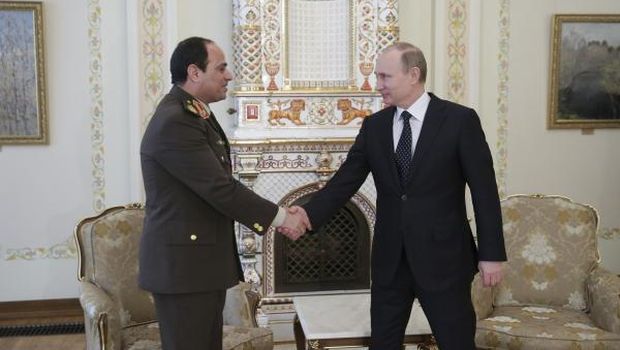The new Egyptian president, Abdel-Fattah El-Sisi, has no choice but to place foreign policy among his top priorities. He is stepping into power in a time when growing complexity is enveloping Egypt’s foreign relations. These complexities were a result of the 2011 revolution, which caused drastic changes in Egypt’s internal situation, which in turn were accompanied by complications with the outside world. These complications were further aggravated by the developments in Egypt over the past four years, including the transfer of power in Egypt to the Muslim Brotherhood and its allies in political Islam; the June 30 revolution that again caused the armed forces to play an influential and powerful role in the political scene in response to prevailing popular will; and the subsequent changes that ended with Sisi’s election to the presidency by a sweeping majority.
President Sisi has come to power at a time when Egypt–United States relations are becoming characterized by a degree of apathy, especially since the June 30 revolution ousted the Muslim Brotherhood from power. There are multiple voices within the American administration: the White House, which takes a conservative stance toward relations with Egypt; the Pentagon, which still maintains seemingly warm ties with the Egyptian military establishment; and Congress, which is divided between Republicans and Democrats about what to make of the situation in Egypt and the consequent economic, military and political challenges it faces. This is all due to the weight of the role played by the US in the international system in general, as well as its special relations with Egypt, which have been in place for the last four decades.
Related to this is the tension in Egypt’s relations with European Union nations. Egypt’s relations with the EU are only marginally independent of its relations with the US. In the case of relations with America and Europe, this tension has revealed itself through political and media campaigns that support the viewpoints of the Muslim Brotherhood and its allies. These campaigns allege that what happened on June 30 was a military coup that ousted an elected civilian. This is the exact opposite of what the majority of the Egyptian people believe, which is that June 30 was a popular uprising supported by the army. What lies behind this attitude of the West in general and America in particular is anger, because the collapse of the Muslim Brotherhood will lead to the failure of the Greater Middle East Project sponsored by Washington. It also threatens peace between Egypt and Israel, which forms the backbone of the Western system of alliances in the region.
Although the West has pledged to change its conservative stance on the situation in Egypt after the June 30 revolution, it is too early to say for sure that the realization of the two fundamental features of the transitional roadmap—amending the constitution and holding elections—will cause a sea change in the US administration’s position. President Sisi’s diplomatic challenge will be daunting, since he must push the West to modify its conservative stance. Naturally, what will help him accomplish these goals are indicators in Egyptian foreign policy emerging in the post-Brotherhood era. These indicators will manifest themselves in Egypt’s quest to diversify its relations with other political blocs in the world, such as Russia, China, Japan and the Non-Aligned Movement, as well as its efforts to de-isolate itself from Africa and restore balance within the continent—despite the Nile water crisis that has broken out between Egypt and Ethiopia.
On the other hand, President Sisi’s election campaign hinted at his determination and intention to restore the central role that Egypt once played in the Arab world and revive the idea of a joint Arab security front. This front could lead to an Arab alliance that hangs on the strength of the Egyptian military and Arab economic power, especially that of the Gulf states. The alliance would ensure security within the region and confront any risks to this security. However, the creation of such an alliance would face many challenges—particularly Qatar’s adoption of the policy to support the restoration of the Muslim Brotherhood to power in Egypt. There is no doubt that Egypt’s actions in the face of terrorism, which has exposed the country from within and has threatened it from without, will play a role in changing some international and Arab attitudes towards the country. These attitudes are currently neutral towards Egypt, but everyone is aware that combatting terrorism is both a national and international matter, and that no one can abandon their support for those who are fighting it.
What is certain is that Sisi’s administration will stand by the broad values of the July 23 revolution, which are reflected in an independence of the national will, rejection of any form of interference in Egypt’s internal affairs, the establishment of a system of government that pleases Egyptians, and preservation of the freedoms of democracy. These will be the main factors in changing foreign attitudes towards Egypt and assisting Egyptian diplomacy, in order for Egypt to regain a balance in its international relations. This balance will be based on mutual interests and the preseveration of the Egyptian people’s rights as part of the Arab nation, as well as a reinstating of Egypt’s role in the region and its impact on the surrounding Arab countries. This is a matter no international force can ignore.
The counterpoint to this article can be read here.
